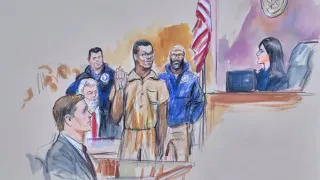November 17, 2019
Hong Kong Officer Hit by Arrow; Police Fire Water Cannons
Ken Moritsugu READ TIME: 3 MIN.
A Hong Kong police officer was hit in the leg by an arrow Sunday as authorities used tear gas and water cannons to try to drive back protesters occupying a university campus and blocking a major road tunnel under the city's harbor.
Police said the arrow struck a media liaison officer and he was taken to a hospital. Photos on the department's Facebook page show the arrow sticking out of the back of the officer's lower leg through his pants.
The protesters held their ground for most of the day, as water cannon trucks drove over bricks and nails strewn by protesters to spray them at close range. They began retreating into Hong Kong Polytechnic University near sunset, fearing they would be trapped as police fired tear gas volleys and approached from the opposite direction.
The use of bows and arrows, along with a gasoline bombs launched with catapults, threatened to escalate the violence in the more than five-month-long anti-government movement. Protesters are trying to keep the pressure on Hong Kong leaders, who have rejected most of their demands.
The protests were sparked by proposed legislation that would have allowed the extradition of criminal suspects to the mainland. Activists saw it as an erosion of Hong Kong's autonomy under the "one country, two systems" formula implemented in 1997, when Britain returned the territory to China.
The bill has been withdrawn, but the protests have expanded into a wider resistance movement against what is perceived as the growing control of Hong Kong by Communist China, along with calls for full democracy for the territory.
Sunday's daytime faceoff came after a pitched battle at night in which the two sides exchanged tear gas and gasoline bombs that left fires blazing in the street. Many protesters retreated inside the Polytechnic campus, where they have barricaded entrances and set up narrow access control points.
A large group of people arrived in the morning to try to clean up the road but were warned away by protesters. Riot police shot several volleys of tear gas at the protesters, who sheltered behind a wall of umbrellas and threw gasoline bombs into nearby bushes and trees, setting them on fire.
The water cannons arrived in the early afternoon, one using blue-dyed water to drench the protesters.
Protesters have largely retreated from occupations of several major campuses they held last week, except for the contingent at Polytechnic. That group is also blocking access to one of the three main road tunnels that link Hong Kong Island with the rest of the city.
Another group threw bricks in the street to blocked a main thoroughfare in the Mongkok district, as police fired tear gas to try to disperse them. The disruption to Nathan Road may have been an attempt to distract police during the standoff at Polytechnic.
Opposition lawmakers criticized the Chinese military for joining a cleanup to remove debris from streets near Hong Kong Baptist University on Saturday.
Dozens of Chinese troops, dressed in black shorts and olive drab T-shirts, ran out in loose formation and picked up paving stones, rocks and other obstacles that had cluttered the street
The military is allowed to help maintain public order, but only at the request of the Hong Kong government. The government said that it had not requested the military's assistance, describing it as a voluntary community activity.
The Education Bureau announced that classes from kindergarten to high school would be suspended again on Monday because of safety concerns. Classes have been canceled since Thursday, after the bureau came under criticism for not doing so earlier.






